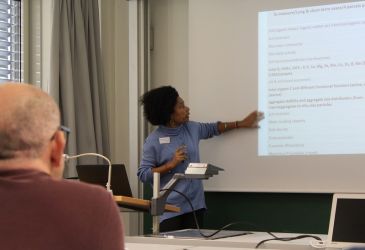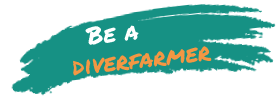The number of women and their presence in powerful posts equals that of men in the Diverfarming European project
A total of 69 female researchers and technicians have been participating in Diverfarming, the project on crop diversification financed by the Horizon 2020 programme of the European Commission, for slightly more than one year. The figure, which supposes 47 percent of the project’s team, is the proof of Diverfarming’s pledge on gender equality. The list of women in Diverfarming is led by Marina Giménez of the Office for International Projects at the Universidad Politécnica de Cartagena, who is its Project Manager.
 Women lead the majority of the territorial coordination within the project. Thus, Beatriz Lozano, researcher at the Universidad de Córdoba, coordinates the work of the South Mediterranean region; Alessandra Trinchera, of the Council for Agricultural Research and Economics – CREA (Italy), the Northern Mediterranean, Kriistina Regina of the Luke Institute (Finland), the Boreal region and Violette Geissen from the Wageningen University (Netherlands), the Atlantic region. Meanwhile, the leadership in field case studies and experimental stations and that of the work packages that analyse the different aspects that the project encompasses are shared out at 50 percent.
Women lead the majority of the territorial coordination within the project. Thus, Beatriz Lozano, researcher at the Universidad de Córdoba, coordinates the work of the South Mediterranean region; Alessandra Trinchera, of the Council for Agricultural Research and Economics – CREA (Italy), the Northern Mediterranean, Kriistina Regina of the Luke Institute (Finland), the Boreal region and Violette Geissen from the Wageningen University (Netherlands), the Atlantic region. Meanwhile, the leadership in field case studies and experimental stations and that of the work packages that analyse the different aspects that the project encompasses are shared out at 50 percent.
This gender parity within the core of the project is complemented by measures that go from driving capacitation activities directed at women or stimulating the participation of women farmers, technicians or workers within the sector in the network of “Communities of men and women farmers” that will put the crop diversification practices into place.
By implementing this model of parity, Diverfarming has become an example when seeking gender parity in the agricultural sector at a moment when, despite the progress experienced in recent years, the situation of women in the labour and economic spheres continues to be determined by inequality.
Salary differences between men and women, the lack of women in upper management, and the higher female unemployment rate compared to men are all problems that are reflected in the European agricultural sector, where the low number of female farm holders must be highlighted.
The need to revert this situation until a scenario of equality is achieved is what has led the European Commission and Diverfarming to include gender equality as a basic principle to be guaranteed.
The measures taken in the project, which will later be evaluated in a final report on gender, aim for this model of parity to be transferred to society, where imbalance still endures, as can be observed in the differences among prominent posts in agricultural institutions and businesses that are integrated in the project: to a great extent the women continue to occupy administrative positions or are technicians, yet remain under-represented in the powerful positions.
The dynamisation of the economy in rural zones that comes with crop diversification helps to create jobs and to anchor the populations of these zones, which also implies the revitalisation of female employment and thus a more equal society.
Diverfarming is a project financed by the Horizon 2020 Programme of the European Commission, within the challenge of “Food Security, Sustainable Agriculture and Forestry, Marine, Maritime and Inland Water Research and the Bioeconomy”, which counts on the participation of the Universities of Cartagena and Córdoba (Spain), Tuscia (Italy), Exeter and Portsmouth (United Kingdom), Wageningen (Netherlands), Trier (Germany), Pecs (Hungary) and ETH Zurich (Switzerland), the research centres Consiglio per la ricerca in agricoltura e l'analisi dell'economia agraria (Italy), the Consejo Superior de Investigaciones Científicas (Spain) and the Natural Resources Institute LUKE (Finland), the agrarian organisation ASAJA, and the companies Casalasco and Barilla (Italy), Arento, Disfrimur Logística and Industrias David (Spain), Nieuw Bromo Van Tilburg and Ekoboerdeij de Lingehof (Netherlands), Weingeut Dr. Frei (Germany), Nedel-Market KFT and Gere (Hungary) and Paavolan Kotijuustola and Polven Juustola (Finland).










